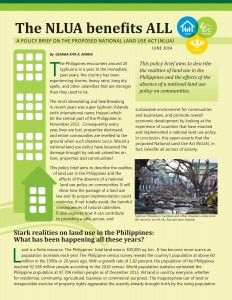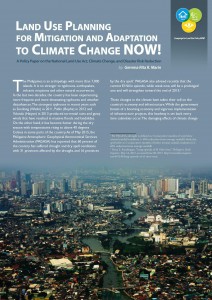These policy briefs prepared by JJCICSI for the Campaign for Land Use Policy (CLUP) Now! explain the urgency of passing a law that will ensure proper use of land for protection and rehabilitation of life-support systems, food security, safe settlements, and more efficient infrastructure systems.
 The NLUA Benefits All: A Policy Brief on the Proposed National Land Use Act (NLUA)
This policy brief aims to describe the realities of land use in the Philippines and the effects of the absence of a national land use policy on communities. It will show how the passage of a land use law and its proper implementation could minimize, if not totally avoid, the harmful consequences of natural calamities. It also explores how it can contribute to providing a safe, secure, and sustainable environment for communities and businesses, and promote overall economic development by looking at the experience of countries that have enacted and implemented a national land use policy. In conclusion, this paper asserts that the proposed National Land Use Act (NLUA), in fact, benefits all sectors of society. The NLUA Benefits All: A Policy Brief on the Proposed National Land Use Act (NLUA)
This policy brief aims to describe the realities of land use in the Philippines and the effects of the absence of a national land use policy on communities. It will show how the passage of a land use law and its proper implementation could minimize, if not totally avoid, the harmful consequences of natural calamities. It also explores how it can contribute to providing a safe, secure, and sustainable environment for communities and businesses, and promote overall economic development by looking at the experience of countries that have enacted and implemented a national land use policy. In conclusion, this paper asserts that the proposed National Land Use Act (NLUA), in fact, benefits all sectors of society. |
 Land Use Planning for Mitigation and Adaptation to Climate Change NOW! Land Use Planning for Mitigation and Adaptation to Climate Change NOW!
This policy paper aims to shed light on the phenomenon of climate change and its relationship to land use. It seeks to inquire on how the use of our lands may have contributed to climate change, and how the latter’s effects, in turn, have impacted on the country’s land and other resources, the ordinary lives and properties of the people. Would a national land use policy that would have guided land use planning and implementation contribute to mitigating or alleviating the disastrous effects of climate change on lives and properties? Specifically for our cities and municipalities, how can land use planning help reduce the risks and dangers caused by the prolonged dry spells or rainfalls experienced in past years? What have been the efforts of the government, civil society organizations and communities to help reduce the risks and dangers posed by climate change, particularly those related to land/land use?
|



